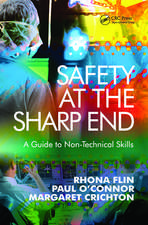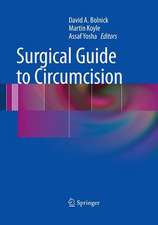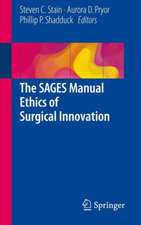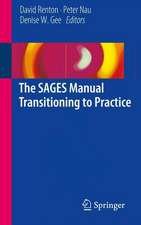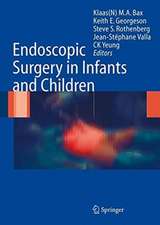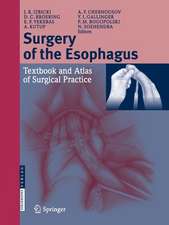Enhancing Surgical Performance: A Primer in Non-technical Skills
Editat de Rhona Flin, George G. Youngson, Steven Yuleen Limba Engleză Paperback – 28 iul 2015
The editors spent the last twelve years as part of the team developing and testing the NOTSS system and delivering presentations and workshops across the world. Readers will benefit by having, in one accessible handbook, a description of the NOTSS system and how it can be used for training, assessment, self-reflection and event analysis.
The book also examines human error, performance limitations, and global safety initiatives in surgery. Because it encourages surgeons to reflect on their own performance and behaviour, it is suitable for surgeons in all specialties and at all levels.
Preț: 400.77 lei
Nou
Puncte Express: 601
Preț estimativ în valută:
76.70€ • 83.28$ • 64.42£
76.70€ • 83.28$ • 64.42£
Carte tipărită la comandă
Livrare economică 22 aprilie-06 mai
Preluare comenzi: 021 569.72.76
Specificații
ISBN-13: 9781482246322
ISBN-10: 1482246325
Pagini: 223
Ilustrații: 24 black & white illustrations, 30 black & white tables
Dimensiuni: 189 x 246 x 12 mm
Greutate: 0.41 kg
Ediția:1
Editura: CRC Press
Colecția CRC Press
ISBN-10: 1482246325
Pagini: 223
Ilustrații: 24 black & white illustrations, 30 black & white tables
Dimensiuni: 189 x 246 x 12 mm
Greutate: 0.41 kg
Ediția:1
Editura: CRC Press
Colecția CRC Press
Public țintă
Professional Practice & DevelopmentCuprins
Surgical Performance: Recognition of the Challenge. Intraoperative Performance, Non‑Technical Skills and Surgical Safety. Human Factors: The Science Behind Non‑Technical Skills. Non-Technical Skills for Surgeons: The NOTSS Behaviour Marker System. Underpinning Concepts. Situation Awareness. Decision Making. Teamwork and Communication. Leadership. Performance-Shaping Factors. Implementation and Improvement. Training Methods For Non-Technical Skills. Assessing Non-Technical Skills in the Operating Room. What Next? Development of Non‑Technical Skills.
Notă biografică
Edited by
Rhona Flin, BSc, PhD, FRSE, FBPsS, holds the chair of Applied Psychology and is the director of the Industrial Psychology Research Centre at the University of Aberdeen in Scotland. She was involved in the NOTECHS project to develop a non-technical skills rating tool for pilots, and supervised the ANTS, NOTSS, SPLINTS and ANTS-AP projects. She was awarded the Roger Green Medal for Human Factors in Aerospace (Royal Aeronautical Society) and the John Bruce Medal for Behavioural Science in Surgery (Royal College of Surgeons Edinburgh). Her current research is on non-technical skills, surgeons’ intra-operative decision making and senior managers’ safety leadership.
George G. Youngson, CBE, MBChB, PhD, FRCPEdin, FRCSEd is an emeritus professor of paediatric surgery at the Royal Aberdeen Children’s Hospital and University of Aberdeen in Scotland. He is a past vice president of the Royal College of Surgeons of Edinburgh and is the founder of its Patient Safety Board. His interests and contributions have included re-configuration of children’s surgical services in Scotland, surgical education, and clinical human factors as they affect surgical performance. He has been involved in the delivery of the NOTSS masterclass in various continents, including Asia, Europe, Africa and North America.
Steven Yule, MA, MSc, PhD, is an assistant professor of surgery at Harvard Medical School in Boston, Massachusetts. Dr Yule is an Organizational Psychologist and Human Factors scientist. He has been involved in the development of a number of assessment tools including NOTSS, SPLINTS and the Surgical Leadership Inventory (SLI). He has led the development of curricula in non-technical skills for surgical trainees and practising surgeons in the United Kingdom and United States. Dr. Yule is the director of education & research at the STRATUS Center for Medical Simulation, Brigham and Women’s Hospital in Boston, where the current research focus is on demonstrating the impact of surgeons’ non-technical skills on process and outcomes, and implementing scalable interventions to enhance patient safety. He is the vice chair of the American College of Surgeons (ACS) committee on non-technical skills and also on faculty at both the Center for Surgery and Public Health and Ariadne Labs for Health System Innovation, at Brigham & Women’s Hospital/ Harvard School of Public Health.
Rhona Flin, BSc, PhD, FRSE, FBPsS, holds the chair of Applied Psychology and is the director of the Industrial Psychology Research Centre at the University of Aberdeen in Scotland. She was involved in the NOTECHS project to develop a non-technical skills rating tool for pilots, and supervised the ANTS, NOTSS, SPLINTS and ANTS-AP projects. She was awarded the Roger Green Medal for Human Factors in Aerospace (Royal Aeronautical Society) and the John Bruce Medal for Behavioural Science in Surgery (Royal College of Surgeons Edinburgh). Her current research is on non-technical skills, surgeons’ intra-operative decision making and senior managers’ safety leadership.
George G. Youngson, CBE, MBChB, PhD, FRCPEdin, FRCSEd is an emeritus professor of paediatric surgery at the Royal Aberdeen Children’s Hospital and University of Aberdeen in Scotland. He is a past vice president of the Royal College of Surgeons of Edinburgh and is the founder of its Patient Safety Board. His interests and contributions have included re-configuration of children’s surgical services in Scotland, surgical education, and clinical human factors as they affect surgical performance. He has been involved in the delivery of the NOTSS masterclass in various continents, including Asia, Europe, Africa and North America.
Steven Yule, MA, MSc, PhD, is an assistant professor of surgery at Harvard Medical School in Boston, Massachusetts. Dr Yule is an Organizational Psychologist and Human Factors scientist. He has been involved in the development of a number of assessment tools including NOTSS, SPLINTS and the Surgical Leadership Inventory (SLI). He has led the development of curricula in non-technical skills for surgical trainees and practising surgeons in the United Kingdom and United States. Dr. Yule is the director of education & research at the STRATUS Center for Medical Simulation, Brigham and Women’s Hospital in Boston, where the current research focus is on demonstrating the impact of surgeons’ non-technical skills on process and outcomes, and implementing scalable interventions to enhance patient safety. He is the vice chair of the American College of Surgeons (ACS) committee on non-technical skills and also on faculty at both the Center for Surgery and Public Health and Ariadne Labs for Health System Innovation, at Brigham & Women’s Hospital/ Harvard School of Public Health.
Recenzii
"Describes very well the process of thought, judgement, analysis and evaluation of risk by surgeons. It emphasises the role of the surgeon as a leader and setting up and maintenance of standards… This book explores a new dimension in the operating theatre environment. It is therefore a unique book."
—(BMA Council Chair's Choice, chosen by Dr Mark Porter, BMA Medical Book Awards 2016) "I am in awe of the knowledge and deep understanding possessed [by the] … contributors of this very important complementary set of skills that not only should but must be embraced by all surgical teams …"
—Bruce Barraclough, Former President, Royal Australasian College of Surgeons
"It defines the types of decision making that surgeons make on a daily basis without necessarily being aware of how they reached those decisions. I believe having this insight will help improve performance."
—Professor Sir Norman S. Williams, Past President, Royal College of Surgeons of England
—(BMA Council Chair's Choice, chosen by Dr Mark Porter, BMA Medical Book Awards 2016) "I am in awe of the knowledge and deep understanding possessed [by the] … contributors of this very important complementary set of skills that not only should but must be embraced by all surgical teams …"
—Bruce Barraclough, Former President, Royal Australasian College of Surgeons
"It defines the types of decision making that surgeons make on a daily basis without necessarily being aware of how they reached those decisions. I believe having this insight will help improve performance."
—Professor Sir Norman S. Williams, Past President, Royal College of Surgeons of England
Descriere
This book explains why non-technical skills are vital for safe and effective performance in the operating theatre. It provides a full account, with supporting empirical evidence, of the Non-Technical Skills for Surgeons (NOTSS) system and behavioural rating framework, which helps identify the key elements involved in successful operative surgery. The system can be used for training, assessment, self-reflection and event analysis. Because it encourages surgeons to reflect on their own performance and behaviour, the book is suitable for surgeons in all specialties and at all levels.

